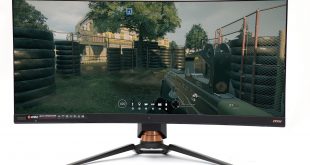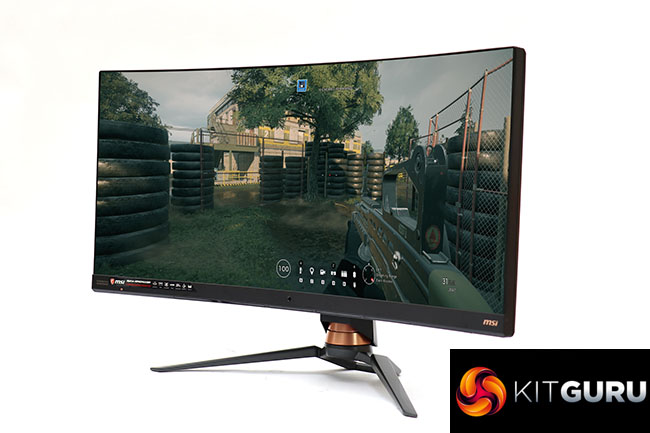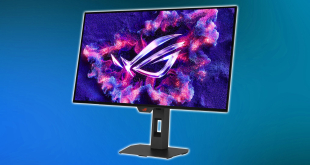
Curved screens make the most sense when they are wide and stretch beyond your peripheral vision. But up until now, if you wanted a superwide 21:9 screen you'd have to sacrifice the gaming abilities with a lower refresh than the 144Hz, usually 100Hz or less. With the Optix MPG341CQR, MSI aims to change that. This is a huge 34in 21:9 curved superwidescreen with 3,440 x 1,440 resolution, but it offers 144Hz and FreeSync 2 adaptive sync as well.
This isn't the first 34in super widescreen we have seen with this resolution. Our first taste was a couple of years ago with the Samsung CF791, and more recently we looked at the professionally-oriented ASUS ProArt PA34V. The MSI screen has the same resolution as both of these, but is slightly more curvy than the ASUS's 1900R, whilst being less curvy than the Samsung's 1500R. Like the latter, a VA panel is used, which is allegedly better for curved screens.
However, both these other screens top out at 100Hz, so aren't ideal for high-refresh gaming. The MPG341CQR's 144Hz refresh allied with AMD FreeSync 2 means that you don't have to sacrifice anything to go superwide. You can have the 21:9 curved aspect, and still not compromise on high frame rates, assuming your graphics hardware can drive this many pixels. The resolution of 3,440 x 1,440 is an odd one, with a width almost as much as 4K, but only a third more vertically than HD.
Nevertheless, this is a very usable screen size and resolution, which will negate the need for a multi-monitor setup. It's wide enough to go beyond your peripheral vision at a regular desk seating distance. But you should still have space for speakers either side. The panel itself has standard characteristics for VA, including 400cd/m2 brightness, and the usual impressive contrast of 3,000:1. MSI quotes a pixel response of 1ms, but doesn't state which type of measurement has been used. We have assumed MPRT rather than grey-to-grey, since we have never seen a VA panel capable of 1ms grey-to-grey.
The physical characteristics lack nothing major either. There are two HDMI 2.0 inputs, plus DisplayPort 1.4 and even cutting-edge USB Type C video connectivity. There's also three-port USB 3.2 Gen 1 hub with one upstream and three downstream Type A ports. If you're feeling a little confused, USB 3.2 Gen 1 is just USB 3.0, and has also been previously named USB 3.1 Gen 1. So that's all very clear then. There are audio minijacks for line and microphone input, plus headphone output. There aren't any internal speakers, however.
Adjustability is comprehensive, too. The screen will tilt forward and back, swivel in either direction, and height can be adjusted too. The one thing you can't do is rotate it into portrait, but that would be a fundamentally dumb thing to do with a 21:9 curved screen anyway. So on paper this monitor has no obvious weak spot. There is, of course, a downside, and that's the price. Unsurprisingly, a screen this large that appears to lack nothing in terms of features costs a significant wedge, in this case over £850. Read on to find out if this is a price worth paying.
Specification:
- Screen size: 34-inch, 21:9 aspect
- Native resolution: 3,440 x 1,440
- Curvature: 1800R
- Refresh rate: 144Hz, AMD FreeSync 2
- Panel type: VA
- Contrast ratio: 3,000:1 (typical)
- Brightness: 400cd/m2
- Response time: 1ms MPRT
- Display inputs: 2 x HDMI 2.0, DisplayPort 1.4, USB Type C
- USB hub: Yes, 3 x USB 3.2 Gen 1 Type A
- Tilt: 5 degrees forward, 15 degrees backward
- Raise: 100mm
- Swivel: 30 degrees left and right
- Portrait: No
- Other: Audio output, audio combo jack, microphone input
Retail Price: £869.99 (inc. VAT)
 KitGuru KitGuru.net – Tech News | Hardware News | Hardware Reviews | IOS | Mobile | Gaming | Graphics Cards
KitGuru KitGuru.net – Tech News | Hardware News | Hardware Reviews | IOS | Mobile | Gaming | Graphics Cards



